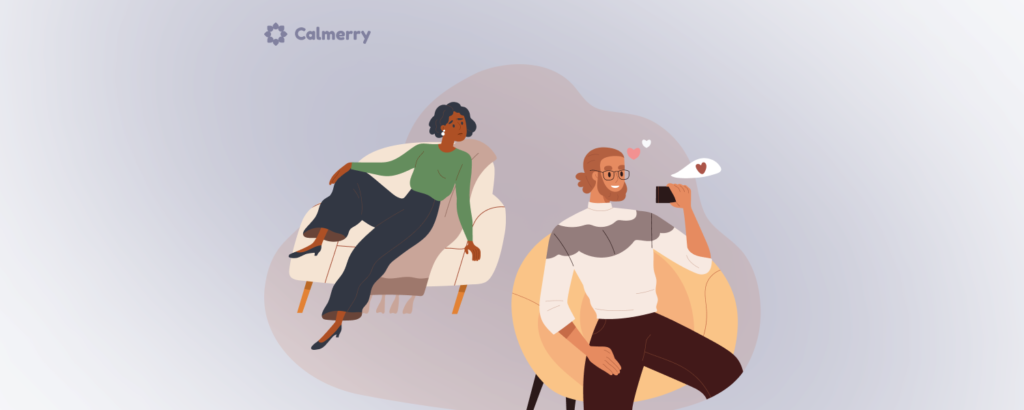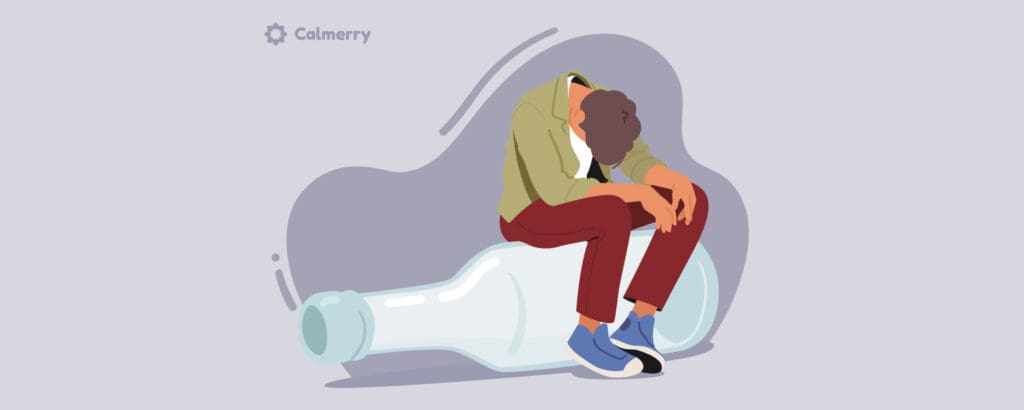Sex Addiction, Hypersexuality, and Compulsive Sexual Behavior: What You Need to Know

In this article
It’s normal to have sexual desires and fantasies.
However, if sexual desire and behavior become dominant and excessive, intruding into one’s way of living or leading to extreme distress, they can be considered problematic. It could be an indication of an addiction like sex addiction or compulsive sexual behavior, also referred to as hypersexual disorder.
What is sex addiction?
Sex addiction (also called hypersexuality) is a condition with a strong craving or behaviors associated with intense sexual fantasies, urges, or activity that are perceived as out of control.
Someone with a sex addiction may find it difficult to manage compulsive sexual thoughts and impulses, which may lead to repetitive behaviors despite negative consequences. These behaviors might include pornography use, compulsive masturbation, or seeking multiple partners despite negative consequences.
How sex addiction relates to other addictions
Indeed, sex addiction shares similarities with other addictions. Like with gambling disorder or substance use disorders, compulsive behavior in this case exists with continued problems despite negative effects. It might be a preoccupation with sexual thoughts, urges, or behaviors that produces distress and impairment in function.
Prevalence and demographics of sexual addiction
Understanding how common sex addiction is helps reduce stigma and shows that people struggling with this aren’t alone.
Sex addiction, or hypersexual disorder, affects approximately 3% to 6% of adults—that’s around 15 million people in the United States alone [1] Kuzma, J. M., & Black, D. W. (2008). Epidemiology, Prevalence, and natural history of compulsive sexual behavior. Psychiatric Clinics of North America, 31(4), 603–611. https://doi.org/10.1016/j.psc.2008.06.005 . The actual sexual addiction rates are likely higher because many people feel ashamed and avoid seeking help. Research shows that hypersexuality statistics likely underestimate how many people are affected—many people avoid seeking help because of shame or fear of judgment.
Who gets sex addiction most often:
Men report compulsive sexual behavior more frequently than women, with some studies suggesting men are affected at rates 3-4 times higher than women [2] Kürbitz, S., Hartmann, U., & Prause, N. (2021). Is Compulsive Sexual Behavior Different in Women vs. Men? Frontiers in Psychiatry, 12, 704377. Retrieved from https://pmc.ncbi.nlm.nih.gov/articles/PMC8348482/ . However, this gap may partly reflect reporting bias rather than true prevalence differences. Women with compulsive sexual behavior often face additional stigma, making them even less likely to seek treatment or participate in research studies.
The sexual disorder typically begins, on average, when individuals are around 18 years old, though onset can range from adolescence through middle age. Most people don’t start treatment until they’re around 37 – nearly two decades after symptoms first appear. This significant delay in seeking help often means the condition has already caused substantial damage to relationships, careers, and mental health by the time treatment begins.
Age and demographic patterns:
While hypersexual disorder can develop at any age, young adults (18-29) appear particularly vulnerable, possibly due to easier access to sexual content online, less developed impulse control, and the stress of life transitions. However, sex addiction demographics show the condition affects people across all adult age groups, socioeconomic backgrounds, and sexual orientations.
Connection to trauma and mental health:
Sexual addiction frequently co-occurs with other mental health conditions and trauma history. Research indicates that 60-80% of individuals with compulsive sexual behavior have experienced some form of childhood trauma, including sexual abuse, emotional neglect, or unstable family environments [3] Slavin, M. N., Scoglio, A. A. J., Blycker, G. R., Potenza, M. N., & Kraus, S. W. (2020). Child sexual abuse and compulsive sexual behavior: A systematic literature review. Current Addiction Reports, 7(1), 76–88. https://doi.org/10.1007/s40429-020-00298-9 . These early experiences can shape how people cope with stress and emotions later in life, sometimes leading to problematic sexual behaviors as a coping mechanism.
People with compulsive sexual behavior commonly have a history of other mental health conditions, including:
- Addiction disorders: Addictive behaviors can co-occur with compulsive sexual behavior, causing further complications. Studies show that people with sex addiction also struggle with substance use disorders [4] Taylor & Francis Group. (n.d.). Hypersexuality among a Substance Use Disorder Population. Taylor & Francis. https://www.tandfonline.com/doi/full/10.1080/10720162.2013.787379 .
- Personality disorders: These disorders can affect sex and relationships, depending on a pattern of behavior and thought.
- Anxiety disorders: Intimacy avoidance and sexual contact or fear could be due to anxiety. Approximately 40% of individuals with hypersexual disorder also meet criteria for an anxiety disorder.
- Obsessive-compulsive disorder (OCD): OCD can involve intrusive behaviors or thoughts that infiltrate sexual activities.
- Mood disorders: Some conditions, such as bipolar disorder, may affect behavior and mood, even sexual behaviors at times. Depression is particularly common, affecting up to 70% of people with sex addiction.
- History of suicide attempts: Past suicide attempts could reflect more severe emotional distress that also affects sexual health.
- Attention-deficit/hyperactivity disorder (ADHD): ADHD can affect concentration and impulsivity, which can, in turn, have an impact on sexual behaviors and relationships.
- Impulse control disorders: Impulsivity problems could, on some occasions, render it hard to control sexual urges.
Is hypersexuality a mental health disorder?
Although “sex addiction” is widely used, it isn’t an official DSM-5 diagnosis. Many clinicians use Compulsive Sexual Behaviour Disorder (CSBD), which is recognized in the WHO ICD-11 as an impulse-control disorder [5] International Classification of Diseases (ICD) World Health Organization. https://www.who.int/standards/classifications/classification-of-diseases .
What causes sex addiction or compulsive sexual behavior disorder?
Sex addiction is a complex condition influenced by biological, psychological, and social factors. Below are some of the common causes of hypersexuality in adults.
Hypersexuality and trauma: Sometimes, past painful experiences can make someone develop sex addiction as a way to cope with deep emotional pain.
Neurodegenerative diseases: In some situations, changes in brain activity might also contribute to hypersexual behaviors. Neurodegenerative disorders such as dementia or Parkinson’s disease affect the parts of the brain that help us manage our actions or impulses.
Substance abuse: The same may happen with substance use. To lessen the effect of painful experiences, one can indulge in substances. An individual may not feel guilty or judgmental, which makes it even harder to control sexual impulses.
Medication side effects: There are some medications (for example, for Parkinson’s disease) that, in rare instances, are reported to produce side effects that may evoke compulsive sexual urges or activity.
Sexual addiction forms
Sexual addiction can come in many forms, with compulsive acts being a primary problem in a person’s life. Understanding the different ways that this addiction can manifest is an important step.
Out-of-control sexual behavior includes:
- Sexual acts: Continuing sexual behaviors despite negative consequences can signal a pattern of addiction. One can engage in sexual behaviors to the extent that one might not be able to stop.
- Pornography: Uncontrolled and excessive watching of pornography is another sign of sexual addictive behavior. It leads to extreme distress or issues in other areas of life.
- Masturbation: Masturbation itself is harmless, but when it becomes a dominant part of life, is practiced compulsively and causes distress or disrupts functioning, that might be a sexual obsession.
- Excessive sexual fantasies: Constant fantasies can be a part of sexual addiction. They can be straining and distracting from day-to-day functioning and concentration.
- Exhibitionism or voyeurism: These behaviors of exposing oneself or spying on someone without their consent can be considered a sex addiction. This behavior may stem from a strong sense of compulsion or emotional distress.
Signs and symptoms of sex addiction
Sex obsession: This is the main sign of sexual addiction. Sex thoughts are intrusive and repetitive, dominating daily life and focus. This preoccupation may deeply interrupt other responsibilities and interests.
Excessive masturbation: Frequent masturbation may quickly progress to a compulsive behavior that is difficult to resist. Such activity may consume a lot of time and energy.
Frequent pornography use: For someone with sex addiction, pornography consumption can be a regular and excessive habit. This behavior may escalate over time, requiring more explicit or deviant sexual content to achieve the desired effect.
Spending a lot of time preparing for sexual activity: An individual may put a lot of energy into planning and anticipating sexual activity, seeking out partners or opportunities.
Frequent use of sexual services: Paid sex becomes an undeniable part of one’s daily life. Over time, these activities can lead to financial and emotional drain.
Risky sexual behaviors: Another sign of sexual obsession can be engaging in reckless and impulsive sexual behaviors, such as unprotected sex with strangers or encounters with multiple sexual partners.
Engaging in sexual acts that conflict with personal values or beliefs: Experiencing sexual activities that clash with what one believes in can lead to feelings of shame, guilt, and self-reproach. This occurs when actions conflict with an individual’s deeply held moral or ethical principles.
Paraphilia: With this sign of sex addiction, one may experience a repeated involvement in exotic sexual interests or activities. These interests cause distress or disrupt the individual or others.
Unable to keep away from sex: Efforts to control sexual behaviors become unsuccessful, even when negative outcomes are experienced. These negative outcomes can affect finances, relationships, physical health, or mental well-being.
What are the risks of sexual addiction or hypersexuality?
The consequences of sex addiction extend far beyond the sexual behaviors themselves.
Relationship and intimacy consequences
Damaged intimate relationships: Compulsive sexual behavior severely strains romantic partnerships. Partners often feel betrayed, deceived, and inadequate. The breakdown of trust can be devastating, sometimes irreparable, even with online therapy. Many relationships end when sexual obsession comes to light.
Family disruption: Beyond romantic relationships, sex addiction affects entire family systems. Children may sense tension or witness arguments without understanding the cause. Extended family relationships suffer when the addiction becomes known. Family gatherings can become sources of stress rather than a means of connection.
Isolation from support networks: As the addiction progresses, people often withdraw from friends and social activities. They may avoid situations where their behavior might be questioned or discovered. This isolation worsens the addiction, creating a cycle where loneliness drives more compulsive behavior.
Inability to form genuine emotional connections: Sex addiction often prevents the development of authentic intimacy. Sexual encounters become mechanical, focused on the physical act rather than the emotional connection. This makes forming meaningful relationships increasingly difficult over time.
Mental and emotional effects
Depression and anxiety: Up to 70% of people with compulsive sexual behavior experience depression. The shame, guilt, and consequences of the addiction fuel these mental health issues. Anxiety about being discovered or about the next compulsive episode becomes constant.
Chronic shame and guilt: The emotional burden of acting against one’s values creates persistent feelings of worthlessness. Many people describe feeling like they’re living a double life, which intensifies shame.
Increased suicidal thoughts: The hypersexuality dangers include a significantly elevated risk of suicidal ideation. The combination of shame, depression, and feeling trapped in the addiction can lead to thoughts of self-harm.
Trauma responses: For those whose sex addiction stems from past trauma, engaging in compulsive sexual behaviors can re-traumatize them, creating new psychological wounds on top of old ones.
Low self-esteem: Repeated failed attempts to control the behavior erode confidence. People begin to see themselves as fundamentally flawed or broken, which makes recovery feel impossible.
Physical health risks
Sexually transmitted infections (STIs): Risky sexual behaviors, particularly unprotected sex with multiple partners, dramatically increase STI risk. Some people with sex addiction report contracting multiple STIs, including HIV.
Unintended pregnancies: For those engaging in heterosexual encounters, the risk of unintended pregnancy rises significantly, leading to complex emotional and practical consequences.
Physical injury: Some forms of compulsive sexual behavior involve physically risky activities that can result in injury. Excessive masturbation can cause physical damage or discomfort.
Sexual dysfunction: Ironically, compulsive sexual behavior often leads to sexual problems, including erectile dysfunction, delayed ejaculation, or inability to experience pleasure during partnered sex. The brain’s reward system becomes desensitized, requiring increasingly intense stimulation.
Sleep deprivation: Many people with sex addiction spend late-night hours engaged in compulsive behaviors, leading to chronic sleep deprivation with its associated health consequences.
Career and professional impacts
Job loss: Accessing pornography at work, engaging in inappropriate relationships with colleagues, or attendance problems due to addiction frequently result in termination. Some professions require disclosure of certain legal issues, making continued employment impossible after criminal charges.
Damaged professional reputation: In some fields, sexual misconduct allegations can permanently damage one’s professional reputation and career trajectory, even without criminal charges.
Missed opportunities: The time and mental energy consumed by sex addiction mean missing out on career advancement, education, or professional development opportunities.
Reduced productivity: Even when employment continues, work performance suffers. Preoccupation with sexual thoughts, time spent planning or engaging in behaviors, and emotional distress all interfere with job performance.
Financial consequences
Direct costs of the addiction: Paying for pornography subscriptions, sexual services, or maintaining affairs drains financial resources. Some people spend thousands of dollars monthly on their addiction.
Legal expenses: If sexual obsession leads to legal trouble, the costs of attorneys, fines, and court fees can be devastating. Registered sex offender status in some jurisdictions requires ongoing compliance costs.
Relationship-related financial losses: Divorce, separation, and relationship breakdowns often involve significant financial consequences. These might include:
- Asset division
- Alimony
- Child support
- Maintaining separate households
Lost income: Job loss or reduced work hours due to the addiction’s interference means lost current income and potentially reduced lifetime earnings.
Bankruptcy: Some individuals with severe sex addiction face bankruptcy due to the combined financial pressures of the addiction itself, legal consequences, and relationship breakdowns.
Legal and criminal risks
Criminal charges: Some manifestations of sex addiction involve illegal behaviors—public indecency, voyeurism, exhibitionism, soliciting prostitution in areas where it’s illegal, or, in worst cases, offenses involving non-consent or minors.
Sex offender registration: Certain convictions require registration as a sex offender, dramatically impacting where you can live, work, and how you’re perceived by society. This consequence can last decades or even a lifetime.
Incarceration: Criminal charges related to sexual behaviors can result in jail or prison time, creating additional trauma and consequences.
Restraining orders: Unwanted sexual advances or stalking behaviors stemming from compulsive sexual behavior can result in restraining orders, limiting your movements and activities.
Substance use co-occurrence
Increased substance use: Approximately 40-50% of people with sex addiction also struggle with substance abuse [4] Taylor & Francis Group. (n.d.). Hypersexuality among a Substance Use Disorder Population. Taylor & Francis. https://www.tandfonline.com/doi/full/10.1080/10720162.2013.787379 . Some use drugs or alcohol to lower inhibitions before engaging in sexual behaviors they otherwise wouldn’t. Others use substances to numb the shame and guilt afterward.
Dual addiction complications: When both sexual addiction and substance use disorders are present, treatment becomes more complex. Each addiction can trigger the other, and both require simultaneous attention for successful recovery.
The sex addiction complications are serious and far-reaching. These aren’t abstract risks. These are consequences that affect real people’s lives daily. The good news? With appropriate treatment, including online addiction counseling, many of these consequences can be prevented or reversed. Early intervention significantly improves outcomes.
High sex drive or sex addiction: how to tell?
High sex drive refers to regular sex thoughts or behaviors, but is still under control and does not disrupt daily life.
Sex addiction, however, entails compulsive sexual urges that are perceived to be out of control, producing distress, disregarding responsibilities, and persistence even with negative consequences.
If you’re experiencing distressing thoughts or behaviors and feel you might need support, Calmerry therapists who specialize in addiction are here to help. We’ll match you with a qualified expert within 24 hours.
Diagnosing sex addiction
Diagnosing and treating compulsive sexual behavior involves evaluating a pattern of persistent, intense focus on sexual fantasies and behaviors that are distressing or disrupt daily life.
Not yet formally recognized as hypersexuality, it is not included in every diagnostic manual. Clinicians seek a history of failed attempts to control the impulses and serious negative consequences in multiple areas of life.
Managing and treating sexual addiction
The healing process for addiction involves a comprehensive approach that often includes online therapy, support groups, and sometimes medication to address compulsive behaviors and underlying issues. Professional help focuses on developing coping mechanisms and strategies for healthier relationships and behaviors.

Treatment for sex addiction
The most effective therapy options for sex addiction are as follows:
Individual counseling
Working individually with a therapist offers a focused space to explore the drivers behind the addiction and develop personalized strategies for moving forward.
Cognitive behavioral therapy (CBT)
CBT helps you recognize and shift the thought patterns and beliefs that fuel addictive behaviors, giving you tools to cope differently.
Psychodynamic therapy
This approach delves into how past experiences and underlying patterns influence your current behavior. It helps you understand yourself more deeply.
Eye movement desensitization and reprocessing (EMDR)
Sometimes past experiences can play a role in addiction, and EMDR is a therapy that can help process those memories and lessen their impact.
Support groups
These groups create a community where people dealing with similar issues can lean on each other and share their experiences in recovery.
Group therapy
Connecting with others facing similar challenges can be incredibly helpful, and group therapy provides that supportive environment.
Couples counseling or marriage counseling
When sex addiction affects a relationship, working with a counselor together can help partners navigate the challenges and rebuild trust.
How to prevent sexual addiction?
While various factors influence the development of sex addiction, understanding prevention strategies can help. Not everyone can prevent sexual obsession, especially when factors like trauma, brain chemistry, or co-occurring mental health conditions are involved. Still, certain approaches can help reduce risk and support sex addiction early intervention.
Early recognition
Understand hypersexual disorder: Compulsive sexual behaviors typically worsen over time without intervention. Recognizing patterns early allows for earlier help-seeking. Some of the patterns include:
- Using sex to cope with stress
- Increasing time spent on sexual activities
- Feeling unable to stop despite wanting to
Watch for escalation patterns: Sexual addiction rarely begins severely. It develops gradually. What begins as occasional pornography use might escalate to daily use, then to more extreme content, then to acting out behaviors. Recognizing this escalation pattern as problematic rather than normal helps interrupt the progression.
Acknowledge family history: If addiction runs in your family (for example, substance use, gambling, compulsive behaviors), you’re at higher risk for sexual addiction. This doesn’t mean you’ll definitely develop it, but awareness of increased vulnerability helps you monitor your behaviors more carefully.
Identifying and managing triggers of sex addiction
Identify what triggers your urges: Triggers vary from person to person but often include stress, loneliness, boredom, anger, or specific emotional states. Some people notice their compulsive behaviors intensify during life transitions, relationship problems, or work stress. Identifying your personal triggers is the first step toward managing them.
Develop trigger-management strategies: Once you know your triggers, create specific plans to handle them. If loneliness triggers compulsive sexual behavior, strengthen social connections and have a list of friends to call when feeling isolated. If stress is the trigger, develop alternative stress management techniques like exercise, meditation, or talking with a therapist.
Avoid high-risk situations: If certain environments, websites, or social situations trigger compulsive urges, try to avoid them whenever possible. This isn’t about living in fear; it’s about making intentional choices that support your sexual health and well-being.
How to manage compulsive sexual behavior?
Treating underlying conditions
Address co-occurring mental health issues: Depression, anxiety, ADHD, OCD, and other mental health disorders frequently co-occur with sex addiction. Treating these underlying conditions reduces the likelihood of developing or maintaining compulsive sexual behaviors. If you’re using sex to self-medicate emotional distress, proper treatment for that distress removes one major driver of the addiction.
Get substance treatment: Drug and alcohol use lowers inhibitions and impairs judgment, making controlling sexual impulses harder. Substance use will make you more impulsive, which contributes to sexual addiction. If you struggle with substance abuse, getting treatment for that should be a priority. Treating one addiction often helps prevent or address others.
Process past trauma: Since 60-80% of people with compulsive sexual behavior have trauma histories, addressing past traumatic experiences through online therapy (particularly EMDR or trauma-focused CBT) can prevent sexual behaviors from developing as a coping mechanism or help resolve them if they’ve already begun.
Building healthy coping mechanisms
Engage in healthy activities: Concentrating on healthy activities guides positive channels and diverts attention from sexual urges. Regular exercise, creative pursuits, volunteering, social activities, and hobbies that bring genuine satisfaction all compete with compulsive sexual behaviors for your time and attention.
Develop emotional regulation skills: Many people turn to compulsive sexual behavior because they don’t have other effective ways to manage difficult emotions. Learning skills like mindfulness, deep breathing, journaling, or talking through feelings helps you handle emotional distress without engaging in sexual behaviors.
Create a balanced life: When life feels empty or unfulfilling, people are more vulnerable to addiction of all types. Building a life with meaningful work, satisfying relationships, engaging hobbies, and a sense of purpose reduces the appeal of compulsive behaviors that offer only temporary relief.
Knowing when to seek therapy for sexual addiction
Don’t wait for rock bottom. If you’re concerned about your sexual behaviors, that concern itself is reason enough to talk to a professional. Early intervention prevents the progression to more severe forms of the disorder.
If you’re wondering whether your sexual behaviors are problematic, ask yourself these questions:
- Do I use sex to cope with difficult feelings?
- Have I tried to cut back but couldn’t?
- Am I keeping sexual behaviors secret?
- Do I feel ashamed afterward?
- Would I be embarrassed if others knew the extent of my sexual activities?
If any of your answers are “yes,” reaching out for preventive therapy could be a helpful next step. Addiction counseling isn’t just for severe cases. It’s also valuable for prevention and early intervention.
Building strong support systems
Maintain honest relationships: Isolation feeds addiction. Maintaining open and honest relationships with friends and family fosters accountability and support. You don’t need to share everything, but having people in your life who check in on your well-being makes hiding problematic behaviors harder.
Join support groups proactively: You don’t need a formal diagnosis to get support for people with sexual addiction. Groups like Sex Addicts Anonymous (SAA) or Sex and Love Addicts Anonymous (SLAA) welcome anyone seeking support, including those in early stages of recognizing a problem.
Find a mentor: Having someone you trust who knows about your struggles and checks in regularly provides external accountability when your internal motivation wavers.
Commitment to long-term change
Be patient and stay committed: Changing deep-rooted patterns requires time and sustained effort. Prevention isn’t a one-time action but an ongoing process of self-awareness, healthy choices, and willingness to seek help when needed.
Develop relapse-prevention skills: Even after successfully addressing concerning patterns, having a relapse-prevention plan can help. Know your warning signs, maintain your support system, and don’t hesitate to re-engage with therapy for sex addiction or support groups if old patterns start returning.
Practice self-compassion: Shame and self-criticism often worsen compulsive behaviors rather than preventing them. Approaching yourself with compassion when you notice problematic patterns makes seeking help easier and more effective.
While sexual addiction isn’t always preventable, these strategies to reduce sex addiction risk make a meaningful difference. The earlier you start diagnosing sex addiction patterns and take action, the better the outcomes tend to be.
How Calmerry can help with sexual addiction
Calmerry offers a secure and understanding online space to connect with therapists who specialize in addressing sexual addiction. Through professional guidance, you can explore the patterns and triggers behind the behavior.
Our addiction counseling platform provides a confidential way to work towards healthier management and recovery.
Here’s how to get help for sex addiction:
- Complete a brief assessment.
- Get matched with a therapist who specializes in compulsive sexual behavior.
- Choose between video sessions, text therapy, or phone calls based on what feels most comfortable for you.
FAQ
How to tell the difference between a high sex drive and sex addiction?
Sex addiction is different from just having a healthy sex drive. With addiction, sexual thoughts and behaviors spin out of your control and start causing real problems in your life. The impact of sex addiction on relationships becomes obvious. Trust, connection, and emotional intimacy may begin to suffer. But with the right help, these bonds can be repaired.
I think about sex all the time. Is this normal?
It’s pretty normal to think about sex regularly. But if these thoughts are taking over your mind and interfering with your job, daily routine, or relationships, that’s when you should reach out to someone who can help.
What leads someone to develop sex addiction?
No single cause exists. It’s typically a combination of brain chemistry, emotional health, past trauma, and environmental factors working together.
What causes hypersexuality?
Hypersexuality may result from brain chemistry changes, mental health disorders, trauma responses, or coping mechanisms for stress or emotional pain.
Why am I so sexually active all the time?
A high sex drive can be natural. But if sexual activity feels compulsive, causes distress, or leads to negative consequences, it may indicate problematic behavior.
What are the signs and symptoms of hypersexuality?
Strong ongoing urges, continued sexual activity despite harmful consequences, spending excessive time thinking about sex, and failed attempts to reduce behavior.
What are the causes of sex addiction?
Causes involve complex interactions between brain chemistry, trauma history, mental health issues, genetic predisposition, and learned coping patterns.
How does addictive sexual disorder affect mental health and relationships?
When sexual behavior becomes compulsive, it tends to trigger depression and anxiety while piling on intense shame. Relationship issues intensify. Forming real emotional bonds with anyone becomes harder and harder.
What are the treatment options for compulsive sexual behavior?
Getting online counseling for sexual addiction usually means working with a therapist one-on-one, along with joining support groups and sometimes bringing your partner into counseling. CBT and EMDR work particularly well. It’s also crucial to tackle any other mental health struggles or past trauma that might be feeding the addiction.
Kuzma, J. M., & Black, D. W. (2008). Epidemiology, Prevalence, and natural history of compulsive sexual behavior. Psychiatric Clinics of North America, 31(4), 603–611. https://doi.org/10.1016/j.psc.2008.06.005
Kürbitz, S., Hartmann, U., & Prause, N. (2021). Is Compulsive Sexual Behavior Different in Women vs. Men? Frontiers in Psychiatry, 12, 704377. Retrieved from https://pmc.ncbi.nlm.nih.gov/articles/PMC8348482/
Slavin, M. N., Scoglio, A. A. J., Blycker, G. R., Potenza, M. N., & Kraus, S. W. (2020). Child sexual abuse and compulsive sexual behavior: A systematic literature review. Current Addiction Reports, 7(1), 76–88. https://doi.org/10.1007/s40429-020-00298-9
Taylor & Francis Group. (n.d.). Hypersexuality among a Substance Use Disorder Population. Taylor & Francis. https://www.tandfonline.com/doi/full/10.1080/10720162.2013.787379
International Classification of Diseases (ICD) World Health Organization. https://www.who.int/standards/classifications/classification-of-diseases
online therapy
live video session



